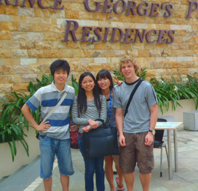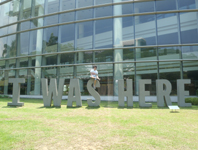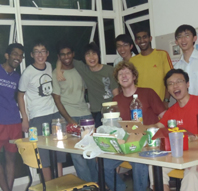Koji Nakata, Exchange Student to Singapore



-Please tell us the name of the university and department where you studied abroad.
At National University of Singapore (NUS), I studied several subjects at the Faculty of Arts and Social Sciences (FASS), with particular concentration on Philosophy and Sociology.
-Please tell us why you first thought about studying abroad.
My first motivation was to expand my horizon and the exchange program perfectly fit into the interest of mine.
-Why did you decide to study at your host university?
NUS is globally renowned for its academic excellence; therefore, I wanted to experience what it means to study at one of the most prestigious universities in Asia.
-Please tell us about some of the aspects of your life abroad.
Along with huge Asian cities, such as Hong Kong and Shanghai, Singapore is one of the most dynamic cities in the world. Aside from having been able to feel the momentum of the city, I was also fortunate to get a glimpse at how scrupulously the country is designed to embrace its great diversity residing within.
-What are differences you have noticed between Keio and your host university?
The most notable difference is the people who constitute each university. Having studied more than two years at Keio prior to the exchange and having grown up in Japan, it was quite eye-opening for me to study at NUS, in which students and faculties from all over the world converge and interact. I had been greatly inspired by studying, competing, cooperating and interacting with people, each of whom have greatly differing social backgrounds and values. Simultaneously I was also rendered aware of how my identity had been shaped in Japan by living in such a diverse environment and realized how it is also a privilege to have studied at Keio, which has also provided me with many inspiring opportunities just as much as NUS has opened up my horizon. I hope I had was able to influence others by embodying what I have learnt in Keio.
-Please tell us about what you feel you gained by studying abroad.
There are just too many things to enumerate that I have gained during my exchange program. The most invaluable thing I have learnt over there is the significance of being non-judgmental about things of which I have little or no prior knowledge. In other words, I have learnt how much potential learning opportunities are constrained by making preconceived and untested assumptions, and how much more we could learn from unfamiliar things if we abandoned the mentality of being judgmental with out any hands-on experiences. It never means that we should not have our opinions and values, but it is precarious to assume that we are capable of absorbing everything without getting directly involved. Granted, it was not always pleasant to encounter unacquainted cultures, but I have gained so much by putting aside preconceptions and exposing myself to unexplored things I would have never come across otherwise.
Perhaps, I had been slightly aware of the significance of this attitude even before the exchange, but I could not articulate what it really means. Over the course of the immersion into different cultures, I am now assured that this mindset is the fundamental key for embracing differences that sometimes seem insurmountable to be reconciled.
-What is your plan after you graduate?
My current plan (and hope) is to work for a company that could offer me platforms, in which I would be encouraged to develop the skills necessary for achieving a greater level of influence.
Eventually, I would like to be able to give back to the societies, which have made an impact on my life, whether it is the neighborhood of my childhood or the community in which I mingled with people from all over the world. Regardless of whatever society I will eventually end up concentrating on, it takes tremendous time, energy and commitment to become competent and experienced enough to make substantial contribution to the society possible. Therefore it would be great if I could work in a place that continuously challenges me to grow so that my current inflated ambition would one day cease to sound implausible. Having said this, presently I am quite not sure which specific career options are better suited in serving my goal, but whatever career path I will take, I would always bear this motivation in mind.
-Do you have any advice for students who are considering studying abroad?
Simply placing yourself in an unacquainted culture might be inspiring enough, which is an inevitable part of studying abroad, but with the attitude of active involvement on your side, the potential benefit of exchange would be multiplied. As with any other decision we make in our own life, studying abroad would be the life-altering experience depending on our mindset.
Information about your host university
National University of Singapore (NUS) is a leading global university centered in Asia with over 36,000 students from 100 countries. NUS is consistently ranked as one of the world’s top universities.
About the writer
Koji Nakata
Third-year Student,
Faculty of Economics
* The facts are those at the time of the interview.
